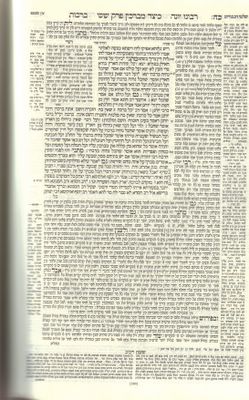
HIDE/SHOW IMAGE
28b
{Brachot 40a}
Rabba bar Shmuel once visited the house of the Exilarch, and they brought him bread and he broke it at once.
They said to him: Has the Master retraced his own teaching?
He replied: This requires no condiment.
MISHNAH.
IF ONE SAYS OVER FRUIT OF THE TREE Borei Peri HaAdama,
HE HAS PERFORMED HIS OBLIGATION.
BUT IF HE SAID OVER PRODUCE OF THE GROUND Borei Peri HaEtz
HE HAS NOT PERFORMED HIS OBLIGATION.
IF HE SAYS Shehakol Nihyah Bidvaro {'BY WHOSE WORD ALL THINGS EXIST' -- /nihyeh. Sfard/Ashkenaz divergence} OVER ANY OF THEM
HE HAS PERFORMED HIS OBLIGATION.
OVER ANYTHING WHICH DOES NOT GROW FROM THE EARTH ONE SAYS:Shehakol Nihyah Bidvaro
OVER VINEGAR, NOBELOTH {withering products} AND LOCUSTS ONE SAYS, 'BY WHOSE WORD ALL THINGS EXIST'.
R. JUDAH SAYS: OVER ANYTHING TO WHICH A KIND OF CURSE ATTACHES NO BENEDICTION IS SAID
{Brachot 40b}
Gemara:
{The Mishna had said:} "IF HE SAYS Shehakol OVER ANY OF THEM:"
It has been stated {by Amoraim}:
Rav Huna said: Except over bread and wine.
And Rabbi Yochanan said: Even on bread and wine.
And the halacha is like Rabbi Yochanan.
Rav said that any benediction in which the Divine Name is not mentioned is no benediction.
And Rabbi Yochanan said: Any benediction in which [God's] Kingship and mentioning of the Name is no benediction.
And we establish like Rabbi Yochanan that you need mentioning of the {Divine} Name and Kingship.
{The Mishna had said:} "OVER ANYTHING WHICH DOES NOT GROW FROM THE EARTH ONE SAYS:Shehakol":
The Sages learnt {in a brayta}: Over anything which does not grow from the ground, such as the flesh of cattle, beasts and birds and fishes, one says Shehakol nihya bidvaro. Over bread which has become mouldy and over wine on which a film has formed and cooked food which has become spoilt one says Shehakol nihya bidvaro. Over milk, cheese, eggs, and on fish - and on vinegar, and on novalot {withering products} and on the locustr, one says Shehakol. Rabbi Yehuda says: Anything whose kind is a curse we don't bless over it. Over salt and brine and morils and truffles one says Shehakol nihya bidvaro.
MISHNA:
IF ONE HAS SEVERAL VARIETIES BEFORE HIM,
R. JUDAH SAYS THAT IF THERE IS AMONG THEM SOMETHING OF THE SEVEN KINDS, HE MAKES THE BLESSING OVER THAT,
BUT THE SAGES SAY THAT HE MAY MAKE THE BLESSING OVER ANY KIND THAT HE PLEASES.
{Brachot 41a}
Gemara:
Ulla said: The dispute is only in the case where the blessings [over the several varieties] are the same, such as an etrog and an olive, for Rabbi Yehuda holds that the species of the 7 kinds is more important, while the Sages held that being better liked is of more importance. But when their blessings are not identical, all agree that he blesses on one, and then returns and blesses on the other, and whichever he wants comes first.
Rav Yosef, and some say Rav Yitzchak, said: whichever comes first in this pasuk comes first in terms of blessing: (Dvarim 8:8)
| ח אֶרֶץ חִטָּה וּשְׂעֹרָה, וְגֶפֶן וּתְאֵנָה וְרִמּוֹן; אֶרֶץ-זֵית שֶׁמֶן, וּדְבָשׁ. | 8 a land of wheat and barley, and vines and fig-trees and pomegranates; a land of olive-trees and honey; |
Rav Chisda and Rav Hamnuna sat in a meal. They brought before them dates and pomegranates. Rav Hamnuna took the dates and blessed on them first {and they are mentioned last, after pomegaranates, in the just cited verse - "and honey" refers to date honey}.
Rav Chisda said to him: Does Master not hold like this that Rav Yosef, and some say Rav Yitzchak said?



No comments:
Post a Comment